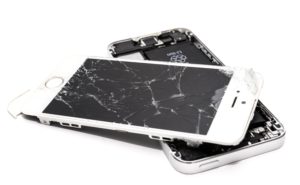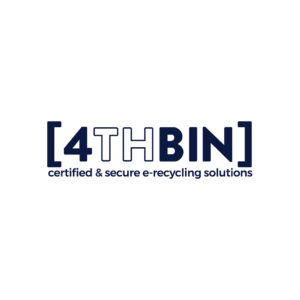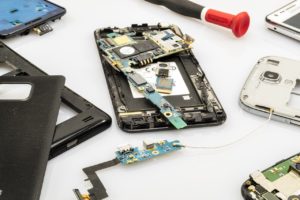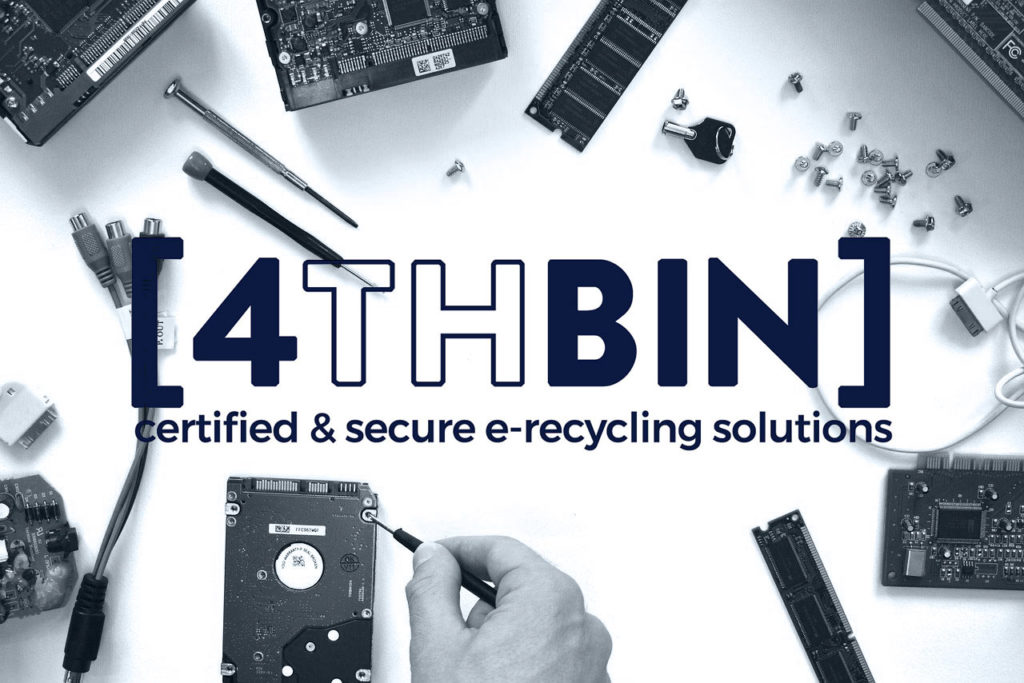
John Kirsch, President and Co-founder of 4THBIN,
When it comes to waste, one area often overlooked is electronic waste. What is e-waste, and how can businesses ensure it’s recycled appropriately? How do I recycle e-waste legally and protect my data at the same time? We sat down with the President and Co-founder of 4THBIN, a leading e-waste recycling solutions provider and one of our trusted partners, to answer these questions and more.
Q: Can you give us some background on 4THBIN and your work in the e-waste space?
A: 4THBIN is a certified and secure e-waste recycling solution provider to over 6,000 businesses from Fortune 100 companies to start-ups across the US.
Whether you have to decommission your company’s data center, manage an office relocation, or simply get rid of a stockpile of old electronics sitting in the IT storage room, 4THBIN can help.
With over a decade of experience and 100% data privacy compliance, we offer a full range of electronics recycling services, including secure data destruction. And we help today’s top industries deliver on their corporate social responsibility (CSR) commitments by ensuring their e-waste is sustainably and legally recycled.
Q: Can you tell us why it’s so important to keep electronic waste separated from trash and mixed recycling? Why does it need to be recycled separately?
 A: Electronic waste, also known as e-waste, is an asset no longer in use that uses or conducts electricity. The term typically refers to technology with complex and hazardous components such as servers, desk computers, laptops, smartphones, tablets, monitors, copiers, and printers.
A: Electronic waste, also known as e-waste, is an asset no longer in use that uses or conducts electricity. The term typically refers to technology with complex and hazardous components such as servers, desk computers, laptops, smartphones, tablets, monitors, copiers, and printers.
Electronics typically contain toxic chemicals that affect nearly every system in the body. These chemicals include cadmium, lead, nickel, mercury, and chromium. While electronics are perfectly safe for everyday use, they become dangerous when smashed open (like on a garbage truck) or exposed to the elements (like in a landfill) where these toxic metals can end up leaching into soil and groundwater.
Almost any product with a circuit board is now banned from landfills and is considered hazardous waste, requiring special handling to protect the health of our communities and our environment. It is illegal to dispose of hazardous waste in the garbage and cannot be recycled with residential curbside recycling. It’s been estimated that e-waste accounts for more than two-thirds or nearly 70% of toxic metals in American landfills.
Q: In addition to ensuring your e-waste is being legally and sustainably recycled, are there other hidden risks you should be aware of when disposing of your company’s old electronics?
 A: Data protection is one of the top risks for businesses today, including the data on your end-of-life electronics. We are familiar with the high-profile online data thefts or losses that numerous companies have experienced in recent years. But what about the data breaches that happen when companies are retiring old electronics or devices? Secure handling of the data on end-of-life electronics is just as critical as online data. It requires the same level of discipline and safeguarding.
A: Data protection is one of the top risks for businesses today, including the data on your end-of-life electronics. We are familiar with the high-profile online data thefts or losses that numerous companies have experienced in recent years. But what about the data breaches that happen when companies are retiring old electronics or devices? Secure handling of the data on end-of-life electronics is just as critical as online data. It requires the same level of discipline and safeguarding.
Today personal data is on everything from computer equipment to mobile devices to internet of things (IoT) devices such as virtual assistants or home automation systems like Amazon Echo with Alexa or Nest systems. Manually deleting data or merely logging out of mobile device application does not erase data from the device. And for hard drives to successfully delete data where it’s nearly impossible to be recovered, you must completely overwrite the data using reputable deletion software using the highest standards in data destruction known as NIST 800-88.
Ensuring secure data destruction of old electronics will prevent you and your company from being vulnerable to the unintended release of sensitive data and identity theft. You want to ensure your electronics recycling vendor destroys your data using the highest standards in data destruction and data privacy compliance and provides you a certificate of data destruction.
Q: What are the most important factors to consider when choosing an e-waste recycling vendor?
A: When it comes to e-waste recycling, there is more to it than meets the eye. Done correctly, recycling your business’s old electronics or data center dismantling takes place under a comprehensive, documented, secure approach that prevents data leaks and ensures equipment disposal is done responsibly and sustainably.
But not all e-recyclers are the same. When choosing an electronics disposal provider for your company, you should consider their:
- Security practices
- Certifications
- Technical expertise
- And of course, reliability
And we encourage our clients to “know thy recycler” by asking these top six questions:
- How do they ensure data security?
- Do they provide a certificate of data erasure?
- Do they provide end-to-end tracking to ensure a chain of custody?
- What certifications do they have? Especially e-Stewards certification.
- Do they provide detailed reporting to ensure compliance with laws and sustainable recycling practices?
- Is the recycling completed domestically in the US?
Q: Can you tell us what certifications 4th Bin currently has and give a brief overview of what each of those certifications means and why they are important?
 A: Helping our customers ensure their e-recycling is handled securely and responsibly is the mission 4THBIN was founded on. We are certified and accredited by the industry’s most rigorous and trusted institutions. These certifications include e-Steward®, R2 Responsible Recycling, B Corp, ISO14001:2015 and ISO 45001:2018.
A: Helping our customers ensure their e-recycling is handled securely and responsibly is the mission 4THBIN was founded on. We are certified and accredited by the industry’s most rigorous and trusted institutions. These certifications include e-Steward®, R2 Responsible Recycling, B Corp, ISO14001:2015 and ISO 45001:2018.
We are proud to say we were New York City’s first company to be certified by e-Stewards – the industry’s gold standard that recognizes electronics recyclers that adhere to the most stringent environmental and socially responsible practices.
The R2 standard was designed to ensure the quality, transparency, and environmental and social responsibility of electronics recycling facilities. And Certified B Corporations are a new kind of business that balances purpose and profit. They are legally required to consider the impact of their decisions on their workers, customers, suppliers, community, and the environment.
4THBIN has also achieved EcoVadis’ highest rating–a platinum rating. EcoVadis is the world’s most trusted business sustainability rating agency. This platinum rating places 4THBIN in the top 1% of the most responsible companies of the 60,000 suppliers they assessed.
All of our recycling is done domestically in the US, and we audit our supply chain partners annually. And we also provide end-to-end tracking, including a detailed report documenting the responsible and legal recycling of our client’s e-waste.
Q: Can you talk about the downstream recycling process? What do you do with it, and where does it end up?
A: Our process starts with the collection and transportation of materials to our sorting facility. We ensure that the materials are properly labeled during this step, any required serial numbers are captured, and any data-bearing devices are in a secure and locked container.
Once at our facility, the inventory list is verified, materials are inspected, weighed, and logged into our system. Materials are then sorted for either reuse, recycling, or data destruction.
 Any data-bearing devices are secured in our data security lab and scheduled for data erasure/destruction in compliance with NIST 800-88 standards. Completion of the data destruction is recorded in our system, and a certificate of data erasure/destruction is created and provided to the customer as requested.
Any data-bearing devices are secured in our data security lab and scheduled for data erasure/destruction in compliance with NIST 800-88 standards. Completion of the data destruction is recorded in our system, and a certificate of data erasure/destruction is created and provided to the customer as requested.
Extending the life of an electronic for reuse is the best option to minimize the impact on the environment and natural resources. Our trained technicians will inspect items to see if they can be refurbished and put back into circulation. Unfortunately, the majority of e-waste that we collect tends to be at the end of its useful life.
For items that can’t be refurbished, we partner with vendors who dismantle them into individual components, such as batteries, circuit boards, plastic, glass, and metals, which are then used as raw materials for the production of new electronics or other products. Because e-waste comes in all shapes and sizes and contains various hazardous materials and varying proportions of glass, metals, and plastic, it makes electronic recycling challenging. It requires multiple steps and processes such as shredding, water separation, and smelting to extract those components.
 Recycling one million cell phones can also recover 35,274 pounds of copper, 772 pounds of silver, 75 pounds of gold, and 33 pounds of palladium. In the US alone, over 140 million cell phones are thrown into landfills every year. If all those cell phones were recycled, it would save enough energy to power 25,000 households for one year.
Recycling one million cell phones can also recover 35,274 pounds of copper, 772 pounds of silver, 75 pounds of gold, and 33 pounds of palladium. In the US alone, over 140 million cell phones are thrown into landfills every year. If all those cell phones were recycled, it would save enough energy to power 25,000 households for one year.
Old cables or wiring contain hard metals like copper or zinc that can be broken down and remade into brand new wiring that can be used in residential and commercial properties, vehicles, or new devices.
Plastic from electronics is being used to make plastic furniture seen in playgrounds, schools, offices, and gardens. Even some of the tables and chairs in your home are made from recycled plastics. And don’t forget about your single-use or alkaline batteries. They are dismantled using a mechanical process to retrieve steel, plastic, and paper components and zinc manganese concentrate for use in other products. For example, zinc manganese can be used as a micronutrient in fertilizer to grow crops.
Q: Can you briefly tell us about the current state of the electronic waste recycling industry? (e-waste recycling rates, the environmental impact of not recycling properly, e-waste recycling policies and programs across the country). What do you expect to see in the future state of recycling in terms of legislation and enforcement of electronic recycling across the country?
A: With the rapid pace at which technology changes, devices seem to become obsolete as soon as you get them, making electronic waste the fastest growing waste stream. According to the World Economic Forum, 50 million tons of e-waste is produced each year and is expected to more than double to 120 million tons by 2050. The Global E-Waste Monitor 2020 report noted North America accounts for 7.7 million tons of e-waste, of which only 15% was recycled. The fate of the rest is largely unknown.
 Today, the US and other countries are taking on the growing challenge of e-waste through various laws, regulations, and treaties. To date, 25 states plus the District of Columbia have passed e-waste related legislation.
Today, the US and other countries are taking on the growing challenge of e-waste through various laws, regulations, and treaties. To date, 25 states plus the District of Columbia have passed e-waste related legislation.
Certain regulations and legislation can hold companies responsible for improper disposal of their e-waste, which could have serious legal ramifications. Several large companies have been fined millions of dollars for alleged improper disposal within the last five years.
And a District Court in Colorado fined and sentenced jail time for a CEO and former VP of a recycling company for illegally disposing of e-waste and falsely claiming to government officials that their e-waste would be recycled in the US.
In addition to the hazardous waste concern around electronic waste, data security laws are also very relevant for e-recycling since personal data can be housed on so many devices. For example, Colorado requires organizations to established written data destruction procedures, including procedures to perform due diligence on all downstream processors.
We heard some encouraging news from the EPA, recently, to help address this growing challenge. The EPA announced the National Recycling Goal to increase the US recycling rate to 50 percent by 2030 and introduce their draft National Recycling Strategy to achieve this, which includes electronic recycling. To achieve this goal, there will need to be greater consistency in national policies as well as incentives and enforcement actions.
For more information on how to properly recycle electronic waste in your city, see the following:
- How to Recycle Electronics in Boston
- How to Recycle Electronics in Chicago
- How to Recycle Electronics in Dallas
- How to Recycle Electronics in New York
- How to Recycle Electronics in Philadelphia
- How to Recycle Electronics in Washington DC

